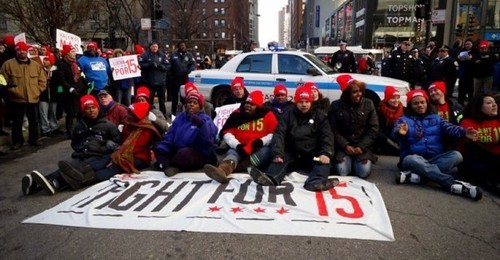 Photo of a group of people sitting in the middle of a street with a Fight for 15 banner in front of them
Photo of a group of people sitting in the middle of a street with a Fight for 15 banner in front of them
Catch Up With Fast Food
By Queen Arsem-O'Malley
Organizers have announced that the ongoing national wave of fast food strikes is going to escalate in the next week. Not sure what we’re talking about? Catch up with the fast food strike in 5 minutes:
Last November in New York City, a campaign for living wages for fast food workers – Fast Food Forward – began with workers walking off the job together and protests outside locations of several fast food chains, including McDonald’s, Burger King, and Wendy’s.
The significance in organizing around fast food lies in the fact that it is in an unskilled industry, meaning that its workers are easily replaced and thus have historically lacked the leverage necessary to pressure employers into improving working conditions and wages (until now). These factors have prompted many to draw parallels to the OURWalmart campaign, in which non-unionized Wal-Mart workers have organized to demand higher wages and better conditions.
Many fast food workers are paid the federal minimum wage of $7.25, and see little to no improvement after years of working with the same company. “I make $7.47 an hour at Pizza Hut and $9.30 an hour at Burger King, where I’ve been working for eight years,” said worker Terrance Wise on Democracy Now! earlier this month. People like Wise – who supports three children with his fiancée and works his two jobs at “about 50, 60 hours a week” – dispel the media-popular myth that fast food workers are people without responsibilities or dependents. In fact, the median age of fast food workers is 28 years old.
In a sample budget that McDonald’s released, ostensibly for the purpose of helping employees plan their limited spending, Wise’s comments about the impossibility of living, let alone raising a family, on minimum wage, are illustrated by the numbers. According to the budget, a person would have to work two fast food jobs to make ends meet – without any money set aside for child care, gas, and with only $20 allotted for health insurance. (Minimum wage in the US "effectively places you at 30% below the official poverty budget,” John Mason, a professor of politics at William Paterson University, told The Guardian.)
In the months since the initial New York actions, workers in cities across the US – from Flint, Michigan to Seattle – have organized actions and one-day strikes, demanding $15 an hour and telling their stories. The last days of July saw workers in several cities walk off the job simultaneously, and the coming weeks promise to see the same, with the possibility of Southern US cities joining the list.
The National Restaurant Association and the Employment Policies Institute responded to the waves of organizing by claiming that a raise in wages would force restaurants to cut jobs and replace workers with automated solutions.
In the face of the cross-franchise and cross-country strikes, massive media coverage, and imminent escalation – which could mean anything from increasing the numbers of workers on strike to picketing outside restaurant locations and offices of corporate executives – we’ll see how much truth is in those sentiments.
The strikes are being backed by the Service Employees International Union (SEIU), an organization that represents nearly 2 million workers. SEIU President Mary Kay Henry killed it last week on The Colbert Report, concluding, “These workers are standing up for all of us, and they are going to make these low-wage jobs good jobs, just as auto jobs became good jobs, service jobs can become good jobs.”
Supporters like the SEIU argue that their demands will not only improve workers’ lives, but will put money in consumers’ pockets, thus spurring a reinvigoration of the economy and wage increases across the board. This may be true, but the real win if this campaign’s demands are met would be the milestone of non-unionized, unskilled industry workers succeeding and setting a hopeful precedent for low-wage workers in this country.
Follow Queen on Twitter @Qaween and look for her weekly round-up on environmentalism and climate change activism starting THIS Monday!
Queen Arsem-O'Malley
once I was cited on wikipedia
Catch up with me @qaween.

